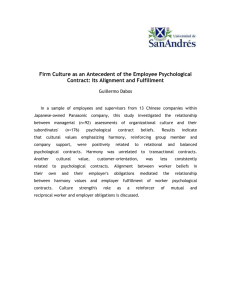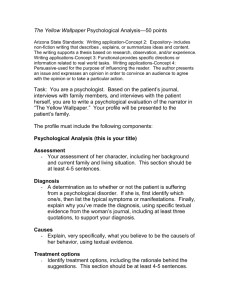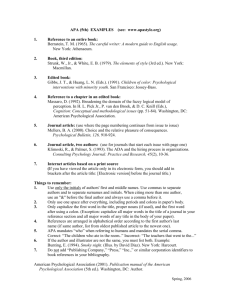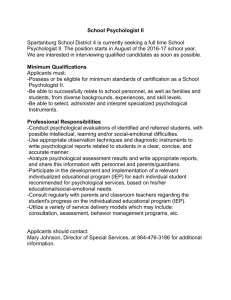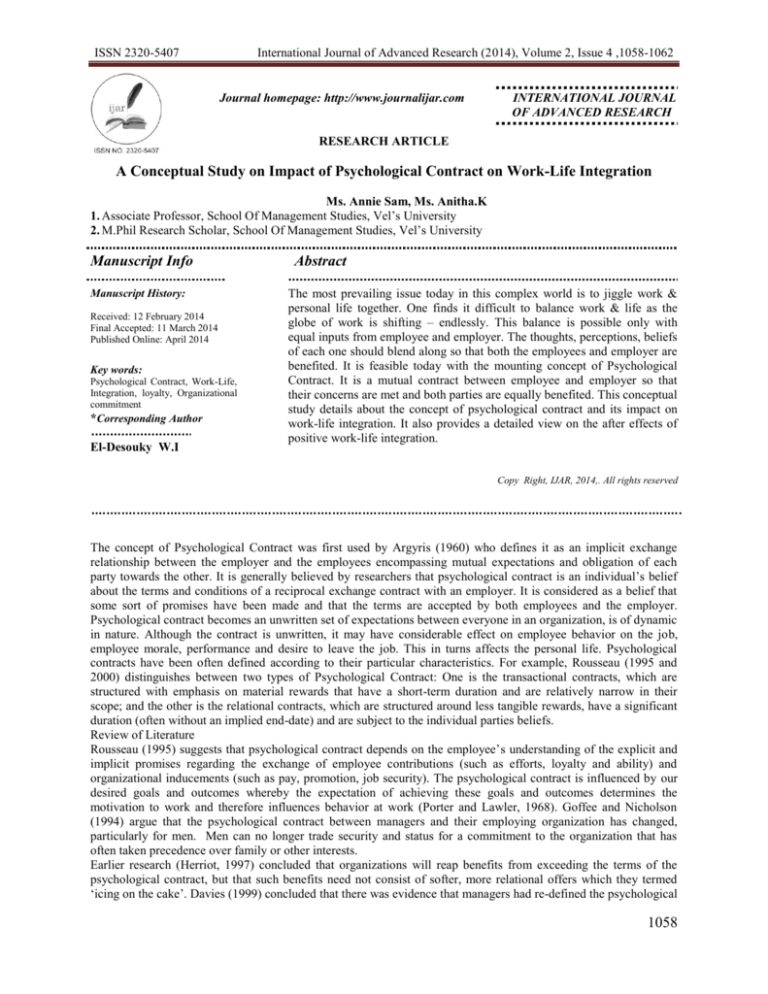
ISSN 2320-5407
International Journal of Advanced Research (2014), Volume 2, Issue 4 ,1058-1062
Journal homepage: http://www.journalijar.com
INTERNATIONAL JOURNAL
OF ADVANCED RESEARCH
RESEARCH ARTICLE
A Conceptual Study on Impact of Psychological Contract on Work-Life Integration
Ms. Annie Sam, Ms. Anitha.K
1. Associate Professor, School Of Management Studies, Vel‟s University
2. M.Phil Research Scholar, School Of Management Studies, Vel‟s University
Manuscript Info
Manuscript History:
Received: 12 February 2014
Final Accepted: 11 March 2014
Published Online: April 2014
Key words:
Psychological Contract, Work-Life,
Integration, loyalty, Organizational
commitment
*Corresponding Author
El-Desouky W.I
Abstract
The most prevailing issue today in this complex world is to jiggle work &
personal life together. One finds it difficult to balance work & life as the
globe of work is shifting – endlessly. This balance is possible only with
equal inputs from employee and employer. The thoughts, perceptions, beliefs
of each one should blend along so that both the employees and employer are
benefited. It is feasible today with the mounting concept of Psychological
Contract. It is a mutual contract between employee and employer so that
their concerns are met and both parties are equally benefited. This conceptual
study details about the concept of psychological contract and its impact on
work-life integration. It also provides a detailed view on the after effects of
positive work-life integration.
Copy Right, IJAR, 2014,. All rights reserved
The concept of Psychological Contract was first used by Argyris (1960) who defines it as an implicit exchange
relationship between the employer and the employees encompassing mutual expectations and obligation of each
party towards the other. It is generally believed by researchers that psychological contract is an individual‟s belief
about the terms and conditions of a reciprocal exchange contract with an employer. It is considered as a belief that
some sort of promises have been made and that the terms are accepted by both employees and the employer.
Psychological contract becomes an unwritten set of expectations between everyone in an organization, is of dynamic
in nature. Although the contract is unwritten, it may have considerable effect on employee behavior on the job,
employee morale, performance and desire to leave the job. This in turns affects the personal life. Psychological
contracts have been often defined according to their particular characteristics. For example, Rousseau (1995 and
2000) distinguishes between two types of Psychological Contract: One is the transactional contracts, which are
structured with emphasis on material rewards that have a short-term duration and are relatively narrow in their
scope; and the other is the relational contracts, which are structured around less tangible rewards, have a significant
duration (often without an implied end-date) and are subject to the individual parties beliefs.
Review of Literature
Rousseau (1995) suggests that psychological contract depends on the employee‟s understanding of the explicit and
implicit promises regarding the exchange of employee contributions (such as efforts, loyalty and ability) and
organizational inducements (such as pay, promotion, job security). The psychological contract is influenced by our
desired goals and outcomes whereby the expectation of achieving these goals and outcomes determines the
motivation to work and therefore influences behavior at work (Porter and Lawler, 1968). Goffee and Nicholson
(1994) argue that the psychological contract between managers and their employing organization has changed,
particularly for men. Men can no longer trade security and status for a commitment to the organization that has
often taken precedence over family or other interests.
Earlier research (Herriot, 1997) concluded that organizations will reap benefits from exceeding the terms of the
psychological contract, but that such benefits need not consist of softer, more relational offers which they termed
„icing on the cake‟. Davies (1999) concluded that there was evidence that managers had re-defined the psychological
1058
ISSN 2320-5407
International Journal of Advanced Research (2014), Volume 2, Issue 4 ,1058-1062
contract within the organizations for which they worked. Individuals were adjusting to the new employment arena
by adopting career strategies which have as their purpose the survival of lifestyle, not the survival of a work-defined
career.
Of particular interest has been the effect of contract violation, which occurs when an employee experiences a
discrepancy between the actual fulfillment of obligations by the organization and promises made about these
obligations (Robinson & Rousseau, 1994; Robinson, 1996). Violation of the contract is thought to lead to feelings of
anger, betrayal, and resentment which in turn lead to decreased employee motivation, dissatisfaction, loss of loyalty
and exit from the organization (Rousseau, 1989; Robinson & Morrison, 1995; Turnley & Feldman, 1999). The role
of work-life linkages in shaping perceptions of contract violation and employee obligations to the organization has
received little empirical attention.
The central proposition here in work-life imbalance gets manifested in a company‟s context is unsupportive to
family demands and negative spillover effects from work to non work life, which will lead to a degradation of
management trust and perception of unfair treatment. These conditions are used to indicate the „state‟ of the
psychological contract (e.g., Guest & Conway, 1998). The state of the psychological contract between employees
and the organization is presented in past researches as mediating the relationship between work experiences and
outcomes such as job satisfaction, organizational commitment and employees‟ intentions to leave the organization
(e.g., Milward & Hopkins, 1998; Guest & Conway, 1997).
Borrowing from Kanter‟s (1977) original distinction, work and non-work spheres of life are „integrated‟ rather than
„separated‟. A study by McKee, Mauthner and MacLean (1999), as well as work discussed by Capelli (1999), shows
those employees are more likely to feel obligation to their organization if the organization takes account of their
non-work obligations. Lucero and Allen (1994) considered work-life benefits as part of a wider organizational
membership package that resulted in positive outcomes in terms of the employees‟ psychological contract. In
psychological contract terms, this evidence suggests that a strategy of „mutuality‟ with respect to the employeremployee relationship and flexibility with respect to work-life issues contributes to a „relational‟ contract. In
contrast to a transactional contract, where employee obligations are based on short-term gain (e.g., financial)
(Rousseau, 1994), a relational contract is based on feelings of affective involvement or attachment in the employee,
and can commit the employer to provide more than purely remunerative support to the individual with investments
in training and career development (Milward & Brewerton, 1999).
Negative Outcomes of Psychological Contract
Porter and Steers (1973) developed the Met-Expectation Model in which they suggested that employees have
individual sets of expectations; when those expectations are unmet, the result is dissatisfaction, leading to turnover.
Hannay et. al. (2000) suggested perceived future opportunities from the employer and the degree to which
employee expectations have been met by the employer to be most significant variables for employee retention. P
Devidson (2001) suggested employee expectations involve reward for work/effort, safe and comfortable working
conditions, opportunities for personal development and career progression, and equitable personnel policies. She
also suggested that employer expectations involve productivity for reward, working diligently in pursuing
organisational objectives and a few other factors. Though Devidson‟s model is simplified, it provides a good insight
into psychological contract never-the-less.
Impact of Psychological Contract on Work-Life Integration
The degree to which a person is able to successfully combine paid work with other aspects of personal life has been
termed “work-life integration” (Lewis, Rapoport, & Gambles, 2002). With ever increasing technological, structural
and demographic changes in employment, including increasing demand for more multi-skilled and flexible
„knowledge workers‟ (Carnoy & Castells, 1997), employees are being associated with negative experiences of work
such as involuntary contingent work and role overload. These experiences have been linked directly and indirectly to
the quality of family life (Greenhaus & Beutell, 1985), psychological well-being, and health (Cooper & Smith,
1985; Nolan, Wichert, & Burchell, 2000). An employee expects to intergrate work and personal life equally to
maintain a balance life.
Increasingly, research has been directed at conceptualizing and specifying the nature of the work-family interface
and its impact on work-life balance (Lambert, 1990; Barling & Sorenson, 1997; Kossek & Ozeki, 1998). At a more
generic level of analysis, management and organizational behavior literature has used the notion of a psychological
contract to describe the relationship between the employee and the organization and, more specifically, employee
beliefs regarding what they should give and receive in terms of their organization.
Concepts such as „mutuality‟ and Clark‟s (2000) work/family borders theory neatly lead to a reconsideration of
work-life integration using the language of psychological contracts. This perspective of work-life issues has found
recent advocates in Kossek and Markel (2001) who noted that research has tended to use only resource-based
arguments for family- or life-friendly policies, until now ignoring the relevance of the concept of mutual
1059
ISSN 2320-5407
International Journal of Advanced Research (2014), Volume 2, Issue 4 ,1058-1062
psychological dependency. Capelli (1999), shows that employees are more likely to feel obligation to their
organization if the organization takes account of their non-work obligations.
Lucero and Allen (1994) considered work-life benefits as part of a wider organizational membership package that
resulted in positive outcomes in terms of the employees‟ psychological contract. Flexible work arrangements
provide the parent with the necessary access to school personnel and community-based providers during service
hours. AD-hoc flexibility is of great benefit to the employees as they can leave the office for few hours instead of
taking a full day or a half day off. Family-friendly supervisors support parents' availability to their children during
times of mental health crisis. With such workplace supports family members can attain greater work-life integration,
enabling them to more fully meet parenting responsibilities, perform work tasks, and take up important roles in their
communities (Rosenzweig, Brennan, Burris, & Shea, 2004; Voydanoff, 2001).
Work – Life Integration
Psychological
Contract
Loyalty
Career
Development
Commitment
Welfare
Measures
Family
An employer expects an employee to be committed to the organization with improved productivity. An employee
expects from an employer to have a friendly work environment and to juggle personal life when there is a need.
With the aid of psychological contract one can integrate family and work life and this would definitely relieve
family stress and employees work with high confidence which eventually increases productivity. This contract also
provides a room for career development for the employees which eventually have a positive impact on family life.
The mutual understanding between the employer and employee in terms of a contract will have a positive impact
towards loyalty and commitment.
Psychological Contract & Organizational Commitment
As Simon noted in the year 1991, to be competitive, organizations require more from their employees than just the
basic yield of the formal employment contract, the "minimal" exchange of labor for wages. Instead, they require
their employees to work with "initiative and enthusiasm," taking personal responsibility in maximizing firm
outcomes. This prompts Simon to ask, "Why do employees often work hard? Why should employees attempt to
maximize the profits of their firms when making the decisions that are delegated to them?" (Simon, 1991 p34). A
part of the answer, and the most important part according to Simon, is the loyalty and commitment employees feel
towards their firms. Because of the premium for committed action on the part of employees, and because of the
apparent erosion of employee commitment, psychological contracts based on employability may be worthwhile to
firms. For instance an employee who works for long hours than the scheduled time will not have a grit feeling that “I
work for more hours, I need to get paid extra”! This thought will be eliminated in the minds of the employees when
there is a positive contract has been developed between the two. Furthermore, the this contract is regarded as a tool
through which if organizations adopt certain management practices to establish and maintain a `healthy`
Psychological contract change could be instituted more easily and there would be increased levels of commitment
and satisfaction (Guest and Conway, 1998, 2004; CIPD 2005a). That trust between organization and employees
along with commitment is important as is the perceived fulfillment of promises.
In the past, organization expected loyalty and commitment over a lengthy period of time and employees expected
job security and remuneration based over their long duration of service to the organization. In this dynamic
environment employees are bound by the care from the organization. Employees search employers where they have
a sense of belongingness, where the employees are cared for their wellness, health and safety. For instance,
Meenumix an Indian Company based at Cochin has most of its employees as Malyali‟s. Here the employees have a
mental thought that they are as one, one family with similar values and beliefs. It is to be noted that the company
offers innumerous gifts every year such as grinders, gold coins, their in-house products sold at half price, internal
company loans etc. This is not a new technique to attract employees but is being followed from the past to retain
1060
ISSN 2320-5407
International Journal of Advanced Research (2014), Volume 2, Issue 4 ,1058-1062
employees whom they consider as the backbone of the organization. This care in the form of a contract will certainly
enhance the loyalty and commitment towards the organization. It is also seen that most of the employees go out of
the company only when they retire.
Conclusion
From the above study one can conclude that a rich establishment of psychological contract will boost employee‟s
commitment and loyalty towards the organization. Employers can note that building a strong contract will enhance
their productivity thus resulting in overall growth of the organization. An employee has to consider the following
key points in establishing a sturdy psychological contract.
- Building Trust
- Communication
- Practicing Transparency
- Feedback and recognition
- Aligning work with strengths
Numerous studies have cited the changes in psychological contract day by day taking into consideration that it
benefits both parties. Psychological contract has changed its outlook from the days it started till now but one should
continuously build and sustain a strong psychological contract to see growth in one „life be it the employer or the
employee‟.
REFERENCE
1.
2.
3.
4.
5.
6.
7.
8.
9.
10.
11.
12.
13.
14.
15.
16.
17.
18.
19.
Argyris, C. (1960) Understanding Organisational Behavior, Homewood, IL: Dorsey Press.
Goffee, R. and Nicholson, N. (1994) „Career Development in Male and Female Managers – Convergence
or Collapse?‟, In: M. Davidson and R. Burke (eds), Women in Management: Current Research Issues. Paul
Chapman, London.
Herriot, P., Manning, W.E.G. and Kidd, J.M. (1997) „The Content of The Psychological Contract‟, British
Journal of Management, 8.
Porter, L.W. and Lawler, E. (1968) Managerial Attitudes and Performance, New York: Irwin.
Rousseau, D.M. (1995) Psychological Contracts in Organisations: Understanding Written and Unwritten
Agreements. London: Sage.
ROBINSON, S. L., & ROUSSEAU, D.M. Violating the psychological contract. Not the
exception but the norm. Journal of Organizational Behavior, 1994, 15, 245-259.
ROBINSON, S.L. Trust and breach of the psychological contract. Administrative Science
Quarterly, 1996, 41, 574-599.
ROBINSON, S.L.& MORRISON, E.W. Psychological contracts and OCB: The effects of
unfulfilled obligations. Journal of Organizational Behavior, 1995, 16, 289-298.
TURNLEY, W.H. & FELDMAN, D.C. Psychological contract violations during
organizational restructuring. Human Resource Management, 1999, 37, 71-83.
GUEST, D.E. & CONWAY, N. Fairness at work and the psychological contract. Institute for Personnel and
Development, 1998.
MILWARD, L.J. & HOPKINS, L.J, Psychological contracts, organizational and job
commitment. Journal of Applied Social Psychology, 1998, 28 (6), 16-31
KANTER, R.M. Work and family in the United States: A critical review and agenda of
research and policy. New York: Russell Sage Foundation, 1977.
MCKEE, L., MAUTHNER, N., & MACLEAN, C. Organisational culture and change; A
study of the male model of work and the psychological contract in the oil and gas industry. Paper presented
at the British Academy of Management Conference, Manchester, September, 1999.
ALLEN, N.J. & MEYER, J.P. The measurement and antecedents of affective, continuance and normative
commitment to the organization. Journal of Occupational Psychology, 1990, 63, 1-18.
CAPELLI, P. The New Deal at work. Boston: Mass.: Harvard Business School Press, 1999.
MILWARD, L. J., & BREWERTON, P. Contractors and their psychological contract. British Journal of
Management, 1999, 10, 253-274.
Simon, H.A. (1991). "Organizations and Markets." Journal of Economic Perspectives 5(2): 25-44.
Guest, D., and Conway, N. (1998) Fairness at work and the psychological contract, London: IPD.
CIPD, (2005a) Reflections on employee well-being and the psychological contract, June.
0BC321170240/0/refempwbpsycon0605.pdf [consulted 20/5/2007].
1061

